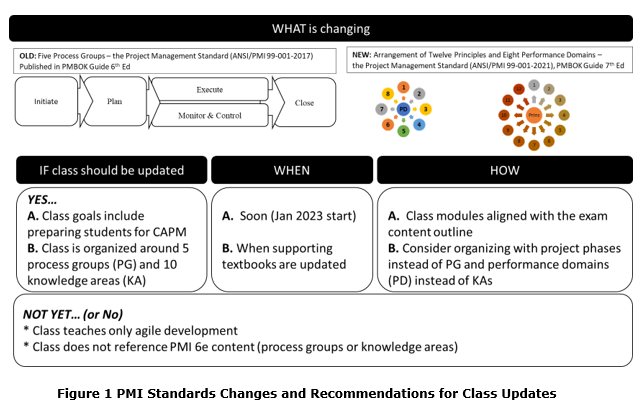2022 EDSIG Proceedings: Abstract Presentation
What needs updated and when? Project Management Education Implications of the Seventh Edition PMBOK Update
Daniel Rush
Boise State University
In its most recent update to the seventh edition of the Guide to the Project Management Book of Knowledge
and The Standard for Project Management (PMBOK 7e), the Project Management Institute has changed from a
process-based standard containing five process groups (Project Management Institute, 2017) to a principles-based
standard with 12 principles (Project Management Institute 2021).This update presents IT educators teaching project
management choices about if, when, and how to incorporate the PMI's principles and performance domains into their
classes (see Figure 1). This work investigates what factors educators might consider most salient when contemplating
updates for their courses. The primary conclusions are: (1) If the course is intended to prepare students for the CAPM exam,
the new 7e material, guided by the Jan 2023 exam content outline should be incorporated soon, (2) classes that do
not reference the 6e process groups and knowledge areas (including those organized around exclusively agile approaches)
can largely ignore the updates, though they may want to review the principles and performance domains to identify
easy areas of overlap and coverage in the future, and (3) that the most affected courses will be those that
organized their content the five project process groups (initiating, planning, executing, monitoring & controlling, and closing),
though the updates are not as urgent as CAPM-organized courses since the PMI has said that 6e content is still valid
for the time being.
Prior research has shown that referencing professional standards and certifications is a way to maintain curriculum relevancy (Knapp, Maurer, and Plachkinova 2017). Further, certifications can boost professionalism and self-efficacy, especially for younger project practitioners (Farashah, Thomas, and Blomquist 2019). Employers also value certifications when looking for new hires, though not as much as academic degrees (Wierschem and Mediavilla 2018). As the current Certified Associate in Project Management (CAPM) exam is based heavily on the inputs, tools, techniques, and outputs for processes organized into the 6e five PGs and 10 KAs, courses whose objectives include preparing students for the CAPM exam will soon be impacted. Further, courses that organized their content around project process groups should note that the process groups were removed from the project management standard and now are considered just one of five 'other models' in the "Models, Methods, and Artifacts" section of the PMBOK guide (7e). A possible (and rather easily executed) solution to this is to consider switching the course organization to project phases, which follow a similar temporal ordering as the process groups. This might be conveniently done when the course's supporting textbook is updated. For courses that primarily embrace agile approaches, instructors should be aware that the 7e updates make the PMI's standard more compatible with agile than the process-group standard was, and that performance domain 2.3 "Development Approach and Life Cycle Performance Domain" is especially helpful in situating agile in the larger context of project management.

REFERENCES
Farashah, A. D., Thomas, J., & Blomquist, T. (2019). Exploring the value of project management certification in selection and recruiting. International Journal of Project Management, 37(1), 14-26. https://doi.org/10.1016/j.ijproman.2018.09.005
Project Management Institute. (2017). A Guide to the Project Management Body of Knowledge (PMBOK® Guide)-Sixth Edition (Sixth Edition, Sixth edition). Project Management Institute.
Project Management Institute. (2021). A Guide to the Project Management Body of Knowledge (Seventh edition). Project Management Institute.
Knapp, K. J., Maurer, C., & Plachkinova, M. (2017). Maintaining a Cybersecurity Curriculum: Professional Certifications as Valuable Guidance. Journal of Information Systems Education, 28(2), 101.
Wierschem, D., & Mediavilla, F. A. M. (2018). Entry Level Technology Positions: No Degree Required. Journal of Information Systems Education, 29(4), 253.